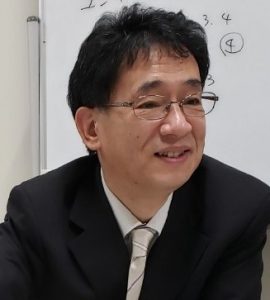TANAKA, Akira
 Professor (Doctor of Economics, Kyoto University)
Professor (Doctor of Economics, Kyoto University)
external link Activity Database on Education and Research / Personal Website
Fields of Research: Business History, Industry Studies
Academic Backgrounds: I received a Master’s degree in Economics from Kyoto University in 1992. I completed the course work of the Doctoral Program in Economics at Kyoto University in 1995, and obtained a Doctoral degree in Economics from Kyoto University in 2012. I worked at the Faculty of Economics, Nagoya City University for 19 years, starting in 1995, and was promoted to Professor in 2009. I moved to Kyoto University in April 2014.
Research Activities: My research fields include modern Japanese economic and business history, international business, and industry studies. My main topic is the historical development of inter-firm coordination system in modern Japanese industries, particularly focusing on the value chain from iron ore to iron and steel, and eventually to automobiles, with an emphasis on Japanese trading companies (sogo shosha). My research interests also include the business history of sogo shosha, comparative industry studies in East Asia, and business groups in Japan. In 2012, I published a single-author book in Japanese titled Postwar Japan’s Mineral Industry: A comparative History of Its Procurement System and Sogo Shosha, which addresses the comparative business history of the Asia-Pacific iron ore and steel industries. This book won two academic awards from the Japan Academy of International Business Studies (JAIBS) and the Japan Society for Distributive Sciences (JSDS)
My work has been published in journals such as the Journal of Business Research, International Negotiations, and many other Japanese journals. I have also presented at a variety of international academic conferences, including the Academy of Management (AOM), the International Association for Chinese Management Research (IACMR), the Asia-Pacific Economic and Business History Conference (APEBH), the International Colloquium of GERPISA, the Japan and Korea Business History Congress, World Congress of Business History (WCBH), the Industry Studies Conference (ISA), the Korea Distribution Association (KODIA), and International Federation of East Asia Management Associations (IFEAMA). I served as the Chair of International Exchange Committee of JSDS from 2014 to 2020.
Courses Taught: Industries and Global Competition, On-site Research Training, Japanese Economic & Business History, Socio-Economic History Readings, Business History & Industry Studies Readings
Skills and Qualities Required for Prospective Students:
I welcome applications from students interested in conducting research in the fields of Economic and Business History or Industry Studies, primarily using qualitative research methods. Students are strongly encouraged to engage in field research, such as interviews, which requires communication skills, possibly including proficiency in the Japanese language.
Examples of Thesis Subjects:
Doctoral Dissertations
- The boom of Japanese-style management in China, 1980s (2018).
- The history of modern seaweed industry (2020).
- The regional financing industry in postwar Kyoto (2024).
- The formation of new type of merchant group (2024).
Master Theses
- Formation and development of home-appliances recycling system in Japan (2016).
- Business models and competition in China’s video streaming service (2019).
- Corporate finance and regional banks in Kyoto: 1960-80s (2019).
- CSR of Japanese SMEs: An exploratory study on companies from Kyoto Prefecture and Shiga Prefecture (2021).
- The adjustment of sogo shosha’s business strategies during China’s economic reform (2022).
- Buyer-supplier power dynamics and eco-innovation: An empirical research study of the textile industry in Taiwan (2023).
- How if Japanese electric waste recycling systems be uniformed? Case studies and institutional comparison (2024).
- The mismatch of expectations between government organization and migrant entrepreneurs: A case study on the support initiatives in Kyoto (2024).